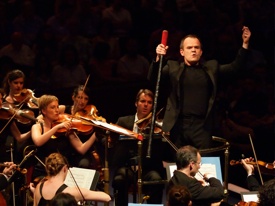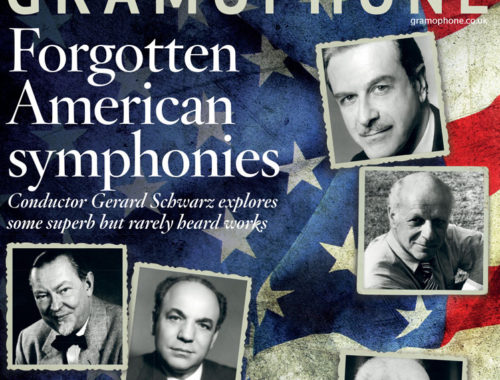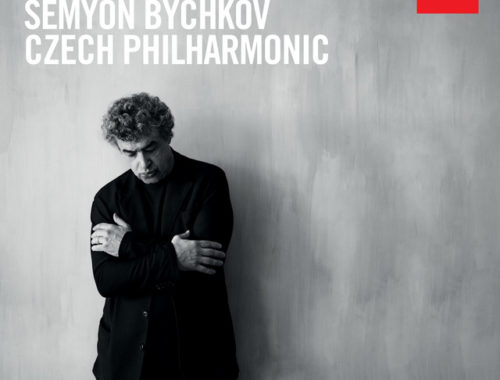Prom 4, Les Siècles, Roth, Royal Albert Hall (Review)
 It could catch on again – the conductor with an ornate staff whacking out the tempo on the podium. At the court of Louis XIV, Jean-Baptiste Lully would have been thus equipped, conductor turning dancing master with a percussive vigour guaranteed to keep the buggers in step. And so Francois-Xavier Roth effectively became Lully at the start of his Prom with Les Siècles, a self-styled period band for all seasons, all periods, where a mere three centuries of changing fashions are routinely all in a single concert’s work.
It could catch on again – the conductor with an ornate staff whacking out the tempo on the podium. At the court of Louis XIV, Jean-Baptiste Lully would have been thus equipped, conductor turning dancing master with a percussive vigour guaranteed to keep the buggers in step. And so Francois-Xavier Roth effectively became Lully at the start of his Prom with Les Siècles, a self-styled period band for all seasons, all periods, where a mere three centuries of changing fashions are routinely all in a single concert’s work.
Les Siècles don’t travel light. The array of instruments necessary to take us from Lully and Rameau through Delibes and Massenet to historically researched Stravinsky must incur punishing excess baggage for these musical tourists. And they dance, too. This was an evening of ballet music of wildly different hues and in the French Baroque the standing woodwind players swayed and bounced like their feet were in motion. The character of Lully’s Overture and Dances from La bourgeois gentilhomme was all in the spring of the rhythms and the soufflé-light texturing with exotic percussion like the ornate Jingling Johnny liberally adding sparkle.
The Rameau shone. Les Indes galantes is a grand tour to exotic climes where savages with French airs leer (in one number) through the dissonance of an appoggiatura which one begins to wonder will ever resolve. What a radical ear Rameau had and how the arrival of trumpets and drums instantly magiced the grandeur of the French Court into the equation.
The switch from Rameau to Delibes – the two biggest and most beloved numbers from Coppélia – was perhaps the most dramatic, the personnel swelling, the élan of the playing now taking on a suavity and opulence that was pretty irresistible. There was bags of tone without heaviness, vitality without forcefulness, and the uplift of the “Waltz” and “Mazurka” suggested feet never touching the ground.
Massenet then spirited us to Spain for Le Cid and Miklos Rosza this was not. The castanet-flecked tunes were, of course, familiar and the woodwind writing particularly beguiling but this capricious away-day to Spain is very much a ballet in search of its opera, too merely “incidental” to be anything more than just musical window dressing. Gorgeously played, though.
And so to the main event – a centenary recreation of Stravinsky’s The Rite of Spring as it might have heard it at its 1913 premiere right down to the very specific French instrumentation (yes, that opening bassoon especially) and autograph score detailing. I had expected shocks and surprises (there were one or two), I had expected breathless speeds and strained sinews, and I had expected the shock of the new to be rekindled. So why did it all seem comparatively tame? Well, I guess “comparatively” is the operative word here. Venue size apart (the Albert Hall defies real immediacy), how can we listen with early 20th century ears when we are so conditioned by the bigger-is-better, in-your-face virtuosity of the early 21st century? We can’t.
What was interesting about this exercise was the “character” of instrumental timbres – horns and bassoons especially – and the way in which less thickness in the texture made for more clarity in the middle of the orchestra where the use of contra-bassoon and flutes (how sultry the alto flute) was that much more telling. The concerted woodwind sound pulled focus so differently and combinations like trumpets and piccolos were arrestingly strident. And how plaintive the “white” sound of those primitive, folk-like, transitions.
Perhaps Roth could have upped the anti and intensified the visceral thrills by pushing up-tempo episodes like “The Games of the Rival Tribes” and “Dance of the Earth” in Part 1. We heard and saw how that worked for him in “The Glorification of the Chosen One” in Part 2 where speeds became progressively edgier and more reckless towards the “Sacrificial Dance”. The final pages were suitably unhinged despite all our preconceptions and as Les Siècles bowed deeply to the audience on all sides French decorum at last seemed wonderfully at odds with what we had just heard. Interesting, yes. Shocking, not really. Perhaps we are now immune to brutality, musical or otherwise?
You May Also Like

GRAMOPHONE: From Where I Sit – August 2019
14/08/2019
A Conversation With JOHN RUTTER
02/09/2010